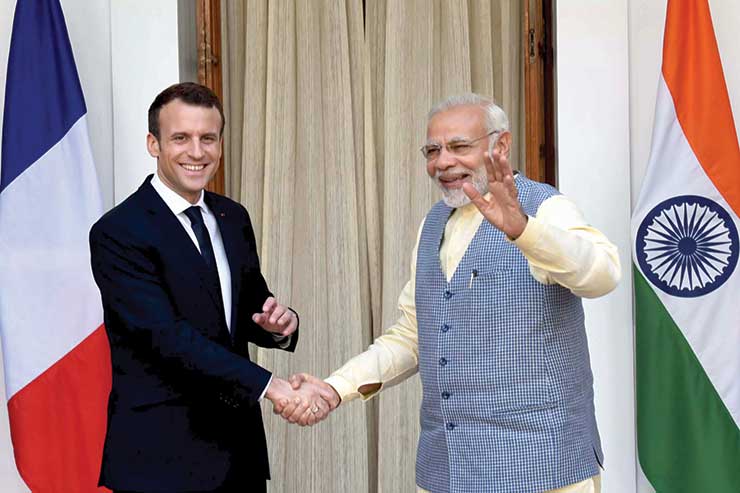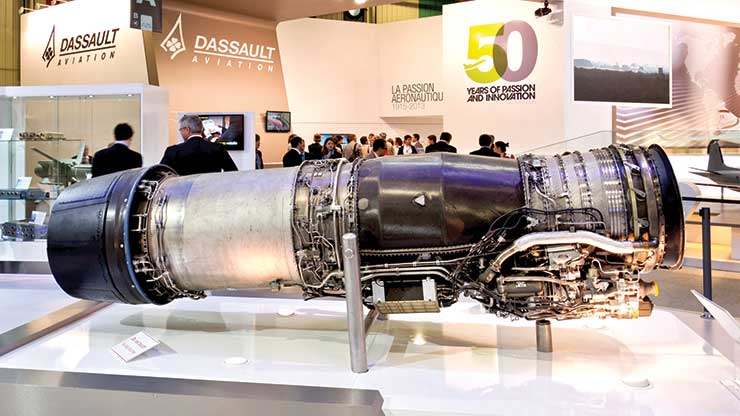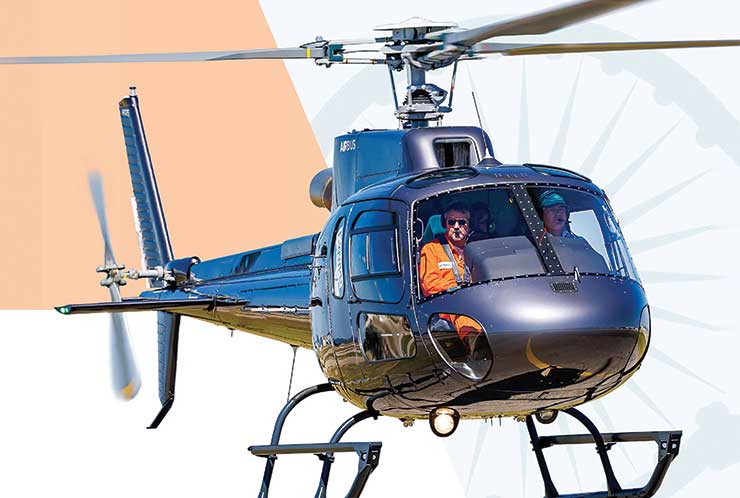
On Friday, January 26, President Emmanuel Macron was the honoured guest of Prime Minister Narendra Modi at India’s prestigious annual military parade, marking Indian Republic Day. The state visit emphasised the strengthening of bilateral relations between the two nations, offering an opportunity to reaffirm longstanding and valuable mutual commitments.
The visit of the French President serves to underscore the deepening strategic ties between the two nations, a relationship further strengthened by Prime Minister Narendra Modi’s participation in last year’s Bastille Day celebrations. For both countries, this partnership represents a tangible manifestation of their shared vision of multipolar international relations and their commitment to national independence. France sees India as playing a crucial role in expanding its influence in the Asia-Pacific region, where India is hoped to serve as an economic and military counterbalance to China. Additionally, for India, joint projects represent not only a means of rebalancing vis-à-vis Chinese expansion but also a practical application of the Make in India strategy.
The Origins of an Enduring Relationship
The modern India- France relationship traces its roots back to the period following India’s independence in 1947, characterised by robust military cooperation that initially began in the defence procurement sector. Over the years, this partnership has remained steadfast, witnessing fluctuations in intensity. From the acquisition of 71 Ouragan fighters in 1953 to the diverse Mirage models during the 1980s and 1990s, particularly in the realm of airborne capabilities, the collaboration continues to stand as a testament to time-tested ties.
Notable Diplomatic Engagements
In 1976, Jacques Chirac, serving as Prime Minister of France, made a notable impact by embarking on his inaugural visit to India during the Indira Gandhi era. This historic visit occurred during a period when India was often overlooked by much of the Anglo-Saxon world. This marked the beginning of a strategic partnership between France and India, now commemorating its 26th anniversary, which commenced on January 26, 1998, during French President Jacques Chirac’s visit to India as the chief guest for the Republic Day celebrations (Jacques Chirac served as Prime Minister of France from 1974 to 1976 and again from 1986 to 1988. He then served as President from 1995 to 2007).A Robust and Multi-Domain Partnership
The India- France strategic partnership boasts deep roots spanning several decades, characterised by extensive collaboration across diverse domains, including defence, economics, and culture. India perceives France as a strong and strategic ally in its foreign relations. Similarly, France regards India as an important partner in the Asian region, sharing fundamental values such as democracy, human rights, and a commitment to multilateral cooperation. The India-France alliance is considered a cornerstone of France’s broader foreign policy objectives in Asia.
Shared Values and Geopolitics
As two of the world’s oldest and largest democracies, France and India share several structural similarities that strengthen their bilateral relationship. These include robust democratic institutions, a diverse multi-party system, and the fundamental principle of universal suffrage.
They also share a vision for a multipolar world order based on principles of equality, justice, and mutual respect. Consequently, France has reaffirmed its strong endorsement for India’s candidacy for permanent membership on the Security Council. As a key member of the Western alliance, France demonstrates a nuanced stance in international politics, maintaining a distinct departure from the stringent influence of the United States.

This approach is exemplified by France’s adherence to Gaullist principles, which prioritise national sovereignty and independence in foreign affairs. For instance, France’s divergence from the United States’ decision to invade Iraq in 2003, underscores its commitment to an autonomous foreign policy agenda. Additionally, French President Emmanuel Macron has openly criticised NATO, highlighting the importance of strategic autonomy for Europe and advocating for greater European defence cooperation. These instances exemplify France’s assertive stance within the Western camp, characterised by a willingness to assert its own interests and principles while collaborating with its allies.
France’s divergence from the United States’ decision to invade Iraq in 2003, underscores its commitment to an autonomous foreign policy agenda. Additionally, French President Emmanuel Macron has openly criticised NATO, highlighting the importance of strategic autonomy for Europe and advocating for greater European defence cooperation
India’s diplomacy also recognises national sovereignty and independence as two key principles of its existence. This position encompasses its historical role in the non-aligned movement and its dynamic relations with global powers such as Russia and the United States. Despite its membership in the Commonwealth, India maintains a deliberate distance, fostering closer ties with France as a result. This strategic shift underscores India’s evolving foreign policy objectives, reflecting a nuanced approach to engagement with the international community. By cultivating stronger partnerships with nations like France, India seeks to assert its independent voice on the global stage while navigating complex geopolitical dynamics with dexterity and foresight.
India’s concern over China’s expanding influence in the Indian Ocean is magnified by the implementation of China’s Go strategy, which involves establishing multiple support bases to monitor and potentially manipulate major maritime communication routes. In response, France’s Indo-Pacific strategy, outlined by President Emmanuel Macron in May 2018, positions India as a crucial ally in countering Chinese expansion. Furthermore, the shared challenges of stability along the Indian Ocean shores, coupled with the presence of significant Indian diasporas, have prompted collaborative efforts between India and France, including joint maritime missions and a mutual interest in strategic areas like the Mozambique Channel, aimed at addressing security concerns heightened by transit vulnerabilities in the Red Sea.
Growing Collaboration
In mutually beneficial collaboration, France and India maintain a multifaceted relationship in various sectors, from agriculture and infrastructure to global decarbonisation, nuclear energy, and cybersecurity. Just last year, they announced a new cooperation program focused on small modular reactors (SMRs) and large modular reactors (LMRs) in nuclear energy. A joint statement following talks at the Élysée Palace on July 14 emphasised the importance of increasing the share of clean energy sources to achieve the Paris Agreement objectives.
However, the real area of increased collaboration in recent times is defence. Talks between Macron and Modi at the beginning of the year resulted in the confirmation of a defence industrial roadmap, aiming to support joint development and production of military equipment and systems. This initiative underscores their commitment to enhancing collaboration in key areas such as defence, innovation, and sustainable development.

In terms of defence, several industrial initiatives are already underway, most of which represent major advances in the Make it India initiative, giving substance to the key strategic projects of the current Indian government. A maintenance, repair, and overhaul workshop for Leading Edge Aviation Propulsion (LEAP) and Rafale engines in India, established by the French company Safran, is currently in progress. Indian Foreign Minister Vinay Kwatra announced that the Indian conglomerate Tata Group and France’s Airbus signed an agreement to jointly manufacture civil helicopters. Furthermore, Airbus and the Tata Group have entered into an agreement to assemble H125 Ecureuil helicopters in India by 2026.
But the most emblematic project remains the construction of the Scorpene submarines by the Mazagon Dock Ltd Shipyard in Mumbai. While the INS Vagsheer, the 6th in a series, will shortly enter service, the prospect of three other examples equipped with Indian Air independent propulsion technology is still on the cards. The extreme technical complexity of this kind of programme seems to illustrate the spirit of this cooperation, according to Macron, who underlined how there would be “no limits” to sharing technology with India.
France’s Indo-Pacific strategy, outlined by President Emmanuel Macron in May 2018, positions India as a crucial ally in countering Chinese expansion. Furthermore, the shared challenges of stability along the Indian Ocean shores, coupled with the presence of significant Indian diasporas, have prompted collaborative efforts between India and France
Perspectives on the Challenge of Multipolarity
In examining the challenge of multipolarity, it’s evident that this strategic partnership is advancing, with numerous projects proposed, though not all implemented, with a focus on mutual benefit. Despite the inherent risks at this ambitious level, the ties are likely to strengthen in the future, making them harder to question. Both parties stand to gain significantly from their collaborative actions on the global stage.
However, the realisation of this positive vision depends on maintaining a consensus, particularly on the concept of multipolarity. Key unpredictable elements include the future stance of the US, which may adopt a less interventionist approach under different leadership scenarios, such as a potential victory for Trump. Macron’s aspiration to lead the Western world in the absence of strong US leadership poses another consideration, potentially conflicting with France’s traditional role as a balancing power. Additionally, the ability of BRICS nations to propose a genuine alternative multipolar world without confrontation with the Western camp is crucial. India’s role as a bridge between North and South remains essential in navigating these complexities.
–The writer is a defence and security industry consultant having varied experience working with medium and large companies majorly in European market. The views expressed are of the writer and do not necessarily reflect the views of Raksha Anirveda















